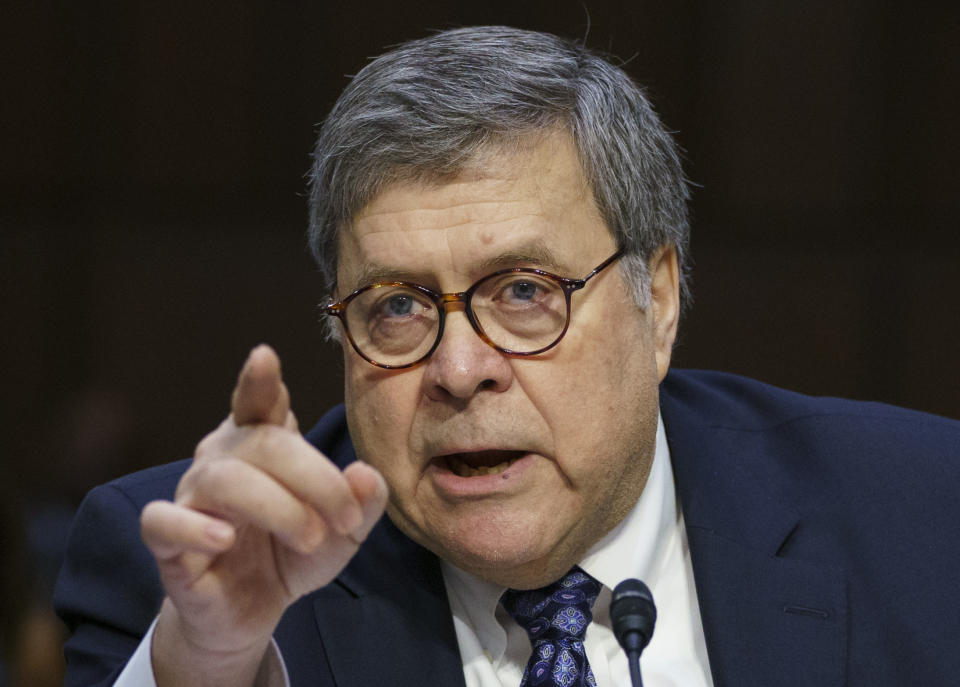Barr signals support for ending marijuana legalization
Attorney general nominee William P. Barr said Tuesday afternoon that he would support a federal law prohibiting the recreational use of marijuana by in all 50 states — even those that have legalized it at the state level.
During his confirmation hearing before the Senate Judiciary Committee, Barr argued that the U.S. government’s increased tolerance for marijuana in recent years has been a mistake. Under questioning by Sen. Cory Booker, D-N.J., Barr said the current discrepancy between federal law and state laws is untenable.
“We either should have a federal law that prohibits marijuana everywhere, which I would support myself. Because I think that it’s a mistake to back off on marijuana. However, if we [don’t] want a federal approach, if we want states to have their own laws, then let’s get there and let’s get there the right way,” Barr told Booker.

Barr, who was tapped by President Trump to lead the Justice Department, had previously held the same position under former President George Bush from 1991 until 1993. Critics of Barr’s tenure argue that his support for harsh drug laws contributed to the epidemic of mass incarceration while supporters applaud his role in the war on drugs.
Since the 1990s, 10 states and the District of Columbia have legalized the recreational use of marijuana and 33 states have legalized medical cannabis.
Early last year, Jeff Sessions, who resigned as attorney general in November, rescinded the “Cole memo” from 2013, which had effectively allowed states to determine their own cannabis laws — sparking fear that the Trump Justice Department would start prosecuting marijuana businesses and customers in states where the drug had been legalized.
When Booker asked Barr whether he thought Sessions was correct in rescinding the Cole memo, Barr said it was important not to upset the interests and expectations of the businesses and investors who have entered the legal marijuana industry.
“However, I think the current situation is untenable and really has to be addressed. It’s almost like a backdoor nullification of federal law. To me it’s a binary choice. Either we have a federal law that applies to everybody —” Barr said, before being interrupted by Booker.
“How would you address that? Do you think it’s appropriate to use federal resources to target marijuana businesses that are compliant with state law?” Booker asked.
“No,” Barr responded. “I said I’m not going to go after companies that have relied on the Cole memorandum.”
Later in the hearing, Sen. Kamala Harris, D-Calif., asked again if he intends to use “the limited federal resources” at his disposal to enforce federal marijuana laws in the states where the drug has been legalized.
“No, I thought I answered that by saying, to the extent that people are complying with the state law’s distribution and production and so forth, we’re not going to go after that. But I do feel we can’t stay in the current situation,” he said. “You can imagine any kind of situation. Can an existing administration and an attorney general start cutting deals with states saying, ‘We’re not going to apply the federal law.’ Some gun law or some other thing saying, ‘We’re not going to apply it in your state.’”
Barr said it is incumbent upon Congress to decide whether marijuana law will be established and governed by a federal government or state-based system.
“This is breeding disrespect for the federal law,” he said.
Mason Tvert, a spokesman for the Marijuana Policy Project, said he was pleased with some of what Barr said on the stand.
“We’re pleased to see that the nominee intends to respect state marijuana laws and refrain from interfering with policies approved by state lawmakers and voters,” Tvert told Yahoo News. “The American public is clearly in support of ending marijuana prohibition and strongly believes the federal government should not interfere with state marijuana laws. The administration has respected that thus far and we hope that will continue under the next attorney general.”
Trump signed the bipartisan 2018 farm bill into law last month. It legalized the hemp plant, which is nearly identical to marijuana but does not contain THC (tetrahydrocannabinol), the psychoactive component that gets people high. Hemp does, however, contain CBD (cannabidiol), another ingredient found in marijuana that has been used to treat anxiety.
A recent poll from the Pew Research Center found that 62 percent of Americans think that marijuana use should be legalized — reflecting an overall upward trend in recent decades.
_____
Read more from Yahoo News:


